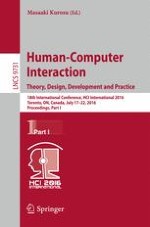2016 | OriginalPaper | Buchkapitel
Can Situations Help with Reusability of Software?
verfasst von : Hua Ming, Carl K. Chang
Erschienen in: Human-Computer Interaction. Theory, Design, Development and Practice
Aktivieren Sie unsere intelligente Suche, um passende Fachinhalte oder Patente zu finden.
Wählen Sie Textabschnitte aus um mit Künstlicher Intelligenz passenden Patente zu finden. powered by
Markieren Sie Textabschnitte, um KI-gestützt weitere passende Inhalte zu finden. powered by
